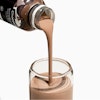🔥 Bestseller


High-protein meal shakes
35g protein
400 cal per bottle
From $58
/ $4.83 per bottle
2
We often take brain health for granted when we’re younger. But older, wiser heads will tell you to stop messing around and incorporate some Sudoku into your routine.
Besides addictive Japanese puzzles, there are other ways to keep your brain sharp, especially when it comes to nutrition. Let’s get stuck into some studies.
When it comes to brain function, just brew it. That’s according to recent studies, which have supported beliefs that caffeine consumption may have a favourable effect on slowing cognitive decline. A CAIDE study reported that drinking 3-5 cups of coffee per day was associated with lower chances of developing dementia and/or Alzheimer’s disease. It’s important to note that more than five cups daily may have the opposite effect, with recent research suggesting a potential increase in dementia risk for those who consume excessive coffee. As always, moderation is key.
Placebo-based research also suggests that 100mg of caffeine improves alertness and overall mood, as well as reduces headaches and tiredness. The health benefits of coffee just might never end (providing you have a good tolerance for caffeine, otherwise, best to stick to decaf!).
Amazing on top of protein pancakes or porridge, a 2023 study led by researchers from King’s College, London, and the University of Reading found that a handful of blueberries a day could be the secret to improving our brain function.
In a randomized, double blind, placebo-controlled trial of 61 healthy men and women aged 65 to 80, those who drank a concoction made with 26 grams of freeze-dried wild blueberry powder experienced better memory and improved accuracy on attention tasks.
The researchers attribute this to the blue pigments in blueberries called anthocyanins, which are a type of polyphenol found in other brightly coloured fruits and berries. While promising, it’s also worth noting that individual responses to blueberries may vary, and more studies are needed to fully understand their long-term impact on cognitive health. But as part of a balanced diet, these antioxidant-packed fruits can certainly offer a boost.
Blueberry smoothie, anyone?
In the grand scheme of micronutrients, choline is a relatively new kid on the block, having only been acknowledged as a required nutrient by the Institute of Medicine in 1998.
Despite the late recognition, choline is nonetheless a VIN (very important nutrient) with several important functions in the body. It serves as a source of methyl groups, for example, which are needed for numerous steps in metabolism and are required for making acetylcholine, an important neurotransmitter. A 2011 study found that higher choline intake was related to better cognitive performance, and it may also be important for fetal brain development, with inadequate intake linked to impaired memory function.
While choline is synthesised by the liver, it’s not produced in quite the amounts we need, making it an essential nutrient we need to get from our diet. However, ongoing research is still determining the exact quantities of choline needed to optimise brain function, and more studies are needed to clarify its full potential.
Is the gut your ‘second brain’? Recent research seems to suggest both are closely linked, with bacteria in the gut being able to send signals through nerves to the brain. Gut bacteria can also stimulate immune system cells in the walls of the gut, which can then send signals through the nerves to the brain. It’s all connected, you see, but what’s this got to do with fermented milk?
Well, fermented foods like kefir contain live beneficial bacteria that can help populate the gut microbiome. While the connection between gut health and brain health is supported by emerging research, more studies are needed to fully establish direct causation. But it’s clear that a happy gut may contribute to a happier brain.
Although the main job of magnesium is to help regulate energy levels and aid muscle and nerve function, that’s not stopping it from having a side hustle. Magnesium is also thought to help with stress and anxiety by regulating levels of the neurotransmitters glutamate and GABA. You can top up your magnesium levels by eating foods such as kale, spinach, and flaxseed (and Huel, of course).
While magnesium has been shown to have beneficial effects on mood and stress, it’s important to strike a balance — both too little and too much magnesium can have adverse effects on health. So while magnesium-rich foods are excellent additions to your diet, it’s essential to strike the right balance.
One interesting ingredient to consider as a ‘brain food’ is curcumin - the active ingredient in spice rack mainstay turmeric. Studies have linked curcumin with improved memory in patients with Alzheimer’s disease, and it’s also thought to boost your dopamine levels. A 2020 review found that curcumin could improve symptoms of depression when used alongside standard treatments.
However, curcumin’s bioavailability is relatively low, meaning the body doesn’t absorb it as efficiently. To reap its benefits, consider pairing turmeric with black pepper, which has been shown to increase absorption. That said, while curcumin holds promise, more research is, of course, needed to confirm its cognitive-enhancing effects, as well as the optimal dosage.
Get 15% off your first order of $50, plus insider access to expert tips, exclusive discounts, and the latest from Huel.
This site is protected by reCAPTCHA and the Google Privacy Policy and Terms of Service apply. You can unsubscribe at any time. Huel Privacy Policy.
